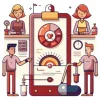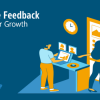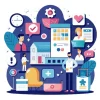
What Is The Impact of Real-Time Feedback on Patient Care?
The healthcare sector faces challenges in meeting patient expectations and ensuring quality care. Real-time feedback on patient care through digital surveys, patient portals, or wearable devices enables immediate communication and timely improvements in care delivery,
leading to enhanced patient satisfaction and outcomes
Role of Real-Time Feedback in Patient Care
Real-time feedback empowers patients to actively participate in their care, enabling providers to promptly address concerns and boost satisfaction.
Patient portals, for example, allowing healthcare providers to quickly address issues and improve overall patient satisfaction.
1. Improving Quality of Care
Collecting feedback during or after treatments helps healthcare providers promptly adjust care plans based on patient needs, ensuring treatments are tailored to individual preferences and improving overall care quality.
2. Building Patient Trust and Loyalty
Sharing feedback results with patients builds transparency and accountability, fostering involvement, improving treatment adherence, and enhances long-term loyalty and trust.
The Future of Real-Time Feedback on Patient Care
The future of real-time feedback in patient care is promising, with AI and machine learning set to enhance its effectiveness by providing predictive insights for tailored interventions.
- Predictive Analytics: AI-powered predictive analytics can identify patterns in patient data, enabling proactive care and preventing adverse events.
- Virtual Health Assistants: Virtual health assistants, powered by AI, can provide real-time support and information to patients, enhancing their experience and satisfaction.
- Integration with Electronic Health Records (EHRs): Seamless integration with EHRs can provide a comprehensive view of patient health, improving care coordination and decision-making.
Challenges and Considerations
While the benefits of real-time feedback on patient care are clear, several challenges must be addressed to maximize its potential, including data privacy and the need for seamless integration with existing systems.
1. Data Privacy and Security
The collection and transmission of real-time health data raise concerns about privacy and security. Healthcare providers must ensure that data is encrypted and stored securely to protect patient confidentiality.
2. Integration with Existing Systems
Integrating real-time feedback mechanisms with existing healthcare systems can be complex and costly. It requires careful planning and collaboration between technology providers and healthcare institutions.
3. Ensuring Accuracy and Relevance
Not all feedback may be accurate or relevant. Healthcare providers need to develop systems for filtering and prioritizing feedback to ensure that only actionable information is considered
Conclusion
Real-time feedback is transforming healthcare by creating a more responsive, efficient, and patient-centered environment. It enhances patient engagement, satisfaction, and clinical outcomes. As technology advances, the impact of real-time feedback on improving care quality and patient outcomes will continue to grow.
Frequently Asked Questions
What is real-time feedback in healthcare?
Real-time feedback in healthcare refers to the immediate collection and response to patient data and feedback. It involves the use of digital tools, wearable devices, and communication platforms to provide instant feedback to healthcare providers and patients.
How does real-time feedback improve patient care?
Real-time feedback improves patient care by enabling early detection of complications, personalizing treatment plans, enhancing patient engagement, and streamlining healthcare processes.
What are the challenges of implementing real-time feedback in healthcare?
Challenges include data privacy and security concerns, the complexity of integrating with existing healthcare systems and ensuring the accuracy and relevance of the feedback collected.
Enhance Patient Care and NABH Compliance with LazyMonkey
LazyMonkey is your all-in-one solution for improving patient care, retaining more patients, and meeting NABH standards. Our powerful QR-based feedback tool enables you to capture real-time insights from patient feedback, discharge surveys, staff and doctor evaluations, and clinical research, while also streamlining inter-departmental communication.
Transform your healthcare facility today - reach out to us at hello@lazymonkey.in, or request a demo here!
Elevate Your Restaurant Experience with LazyMonkey
LazyMonkey’s QR-based feedback system helps you gather real-time insights from customers, track satisfaction levels, and enhance the dining experience. Get instant feedback on your menu, service, and ambience, and make data-driven improvements to boost repeat customers and reviews.
Improve your restaurant today – reach out to us at hello@lazymonkey.in, or request a demo here!
Empower Student Engagement and Campus Improvement with LazyMonkey
LazyMonkey offers a seamless way to gather student feedback, track satisfaction, and enhance campus life. From course evaluations to dorm feedback, our QR-based solution makes it easy to capture valuable insights and improve student retention.
Upgrade your university experience – contact us at hello@lazymonkey.in, or request a demo here!
Streamline Feedback and Drive Performance Across Your Enterprise/Franchise with LazyMonkey
Whether you manage one or multiple locations, LazyMonkey’s QR-based feedback system helps you gather real-time employee and customer feedback. Improve operational efficiency, track satisfaction, and make data-driven decisions to enhance brand consistency and growth.
Transform your franchise today – reach out to us at hello@lazymonkey.in, or request a demo here!
Enhance Customer Satisfaction and Service Standards in Banking with LazyMonkey
LazyMonkey empowers banks to capture real-time feedback from clients across branches. Improve customer experience, assess service quality, and ensure regulatory compliance with our QR-based solution, helping you retain clients and meet banking standards.
Elevate your bank’s customer care – contact us at hello@lazymonkey.in, or request a demo here!
Boost Customer Engagement and Mall Satisfaction with LazyMonkey
LazyMonkey’s QR-based feedback tool enables you to collect feedback from shoppers, track satisfaction, and enhance the mall experience. Gather insights on store services, cleanliness, and entertainment to create an unmatched customer journey.













